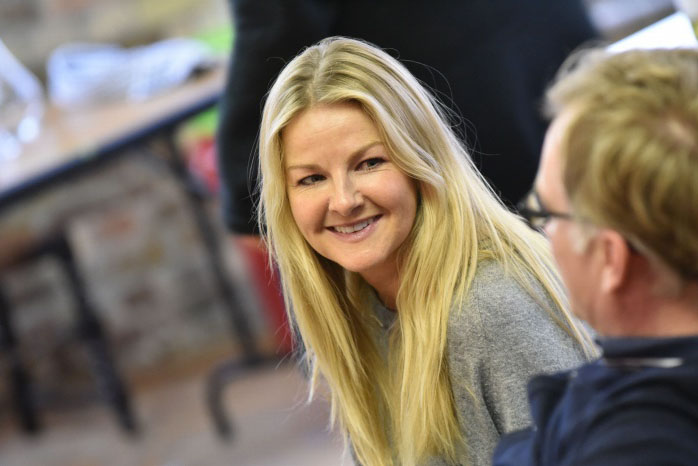
In a trendy, though snug, home in south-east London, Elizabeth (a fantastic Sarah Hadland) and Peter (Jamie Glover) are searching for the spare set of car keys while attempting to get ready for the dinner party they are hosting. Peter likes to know where everything is. Carl (an assured, thoughtful Raymond Coulthard), Elizabeth’s long-time best friend, soon joins to help them. Vincent (Nigel Harman), Elizabeth’s brother, who is soon to join the scene as a guest, narrates the action for some reason.
The dramatic conceit of having one of your main characters also act as narrator usually serves some other purpose, though in this production, beyond making sure the audience’s sympathies are firmly engendered to Vincent from the start, there seems little point. Harman has an immense charm, and initially it is a delight to see him cast his spell, but this soon sours.
The poster advertising What’s In A Name? leaves little doubt on the question of what Vincent suggests he and partner Anna (Olivia Poulet) are going to name their firstborn child, but I won’t spoil it here. The conversation that it sparks is genuinely interesting, punchy, provocative, and often amusing. However, it was also during this that it became clear where the bar for humour was set for the evening.
Too many of the jokes sound straight from a mid-to-late-nineties TV sitcom. They are basic, clearly signposted, and solely trading on stereotypes. Men are from Mars, women are from Venus, didn’t you know? Not forgetting that only gays like the colour orange.
Discussing the play after its curtain call, it suddenly struck my friend and I that, as it was an adaptation, it was most likely made around the Millennium. Unfortunately, What’s In A Name? is an adaptation of Le Prénom, a play that was first put on in 2010, and adapted for the cinema in 2012.
Words and phrases like “poncey,” “bender” and “Guardian reader” serve as punchlines. A thin defence might suggest that the play is challenging such stereotypes, or that it’s smart for engaging with assumptions. There is no proper engagement or interrogation here, but rather stale reproduction.
The problem is not that the play has characters say things that are outdated or boorish, because, of course, people do in real life, all the time. Vincent and Peter are two sides of the same coin, both lacquered with different coats of toxic masculinity. Not only do they get the most stage-time, they start and end the play, and receive the most jokes. Vincent is the narrator, for goodness’ sake. Any reproach he receives is quickly undone in the epilogue. The audience are meant to side with the two of them, despite the valid discontent of Elizabeth, Carl, and Anna.
Vincent questions why the women prefer Carl, who listens to them, is sensitive and less traditionally masculine, and then dismisses him as not being funny. The audience laugh, because, from what we have seen, that’s true. Carl makes the least jokes. Is that the message, then: that “real men” are loud, funny, priapic and piggish, and their partners must live with that? Alternatively, they can live a dry, mirthless life with someone who respects them more.
It is a shame that the quality of the material fluctuates so wildly, as the cast handle all of it with aplomb. Harman occasionally mugs a little too much, particularly whenever he starts flying round the room, but is generally good. Why Vincent and Anna are together remains a mystery, though. One truly expects that she will leave him in the end, because the way that Harman and Poulet play their relationship never quite feels authentic.
Hadland is remarkable. Her characterisation is consistent, and comfortable, and she breathes vitality, humour and a little edge into what others might have played as a stereotypical badgering wife. Her final monologue is something to behold, an impressive feat of breathing control, let alone acting ability. Maybe go see the show for her, and switch your brain off. ★★★☆☆ Will Amott 1st February 2017

